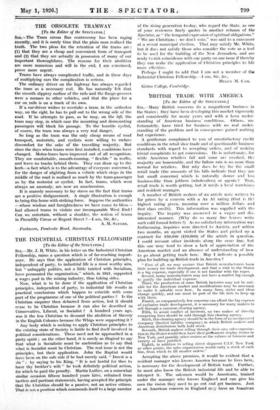BRITISH TRADE WITH AMERICA [To the Editor of the SPECTATOR.]
• -
Sin,—Many British concerns do a magnificent business in the States ; they have been developing thiti market vigorously and consistently for many years and with a keen under- standing of American business' conditions. Others, un- fortunately, have tried for business with no real under- standing of the problem and in consequence gained nothing but experience.
A gentleman complained to you of unsatisfactory credit conditions in the retail 'shoe trade and of questionable business standards with regard to accepting orders, and of making trivial-complaints to get concessions. He is unfortunate, for While American retailers fail' and some are crooked, the. majority are honourable, and the' failure rate is no more than normal for retailers. But why does he try Tor the small retail trade (the amounts of 'his bills indicate that they are but small concerns) which is naturally 'slower and less business-like than jobbers (wholesalers) or agents ? True, retail trade is 'worth getting, but it needs a local ivareliOusu and resident' manager. "
A number of British makers of an article were written to for prices by a concern with a Aa Al rating (that is thi highest rating given; meaning over a million dollars and first-class credit). This information was supplied with the inquiry. The inquiry was answered in a vague and dis- interested 'manner. -(Why do so many fine houses write such 'cold' formal letter-0) As no satisfactory information wai forthcoming, inquiries were directed to Austria, and• within two months, an agent visited the States and picked up a contract' for $50,000. (810,000) of the article in question. I could recount- other incidents along the same line, but this one may tend to show a lack of appreciation of the American market and an absence of understanding of how to go about getting trade here. May I indicate a possible plan for building up British trade in America ?
" First of all, we may assume that British manufacturers have little money for trade development, and that a visit to the States is a big expense, especially if one is not familiar with the ropes.
Second; many manufacturers may not have a market big enough to justify the individual expense.
Third, the production of some British factories may not be suit- able for the American market and modifications may be necessary to make it saleable over here. In many lines, styles and ideas change quickly, and one must be part of the life here to keep up with them.
Fourth, as comparatively few concerns can afford the big expense of exclusive trade development, it is necessary for many makers to sell through a common clearing agency. Fifth, to avoid conflict of interests, no two 'makes of directly competing lines should be sold through this clearing agency. Sixth, this clearing agency should be in the form of en incorporated company (limited liability company) in which British makers and American distributors both hold stock.
Seventh, British makers selling through their own sales organiza- tion in the States would then have their perManent display rooms in New York, and possibly other centres as the volume of business and variety of lines justified. Eighth, in addition to selling direct shipment C.I.F. New York or other points, the sales organization would carry a stock of each line, from which to fill smaller orders."
Accepting the abOve premises, it would be evident that a resident manager who knows America because he lives here, is necessary for the development of British trade. Further, he must also know the British industrial life and be able to' interpret it. The salesmen would be Americans, trained under the manager who knows England and can give his men the vision they need to go out and get business. Just as an American concern in England may have an American manager but English salesmen to come in contact with the trade, so the same principle should be in force here.—I am, Sir, &c.,
AN AMERICAN.















































 Previous page
Previous page